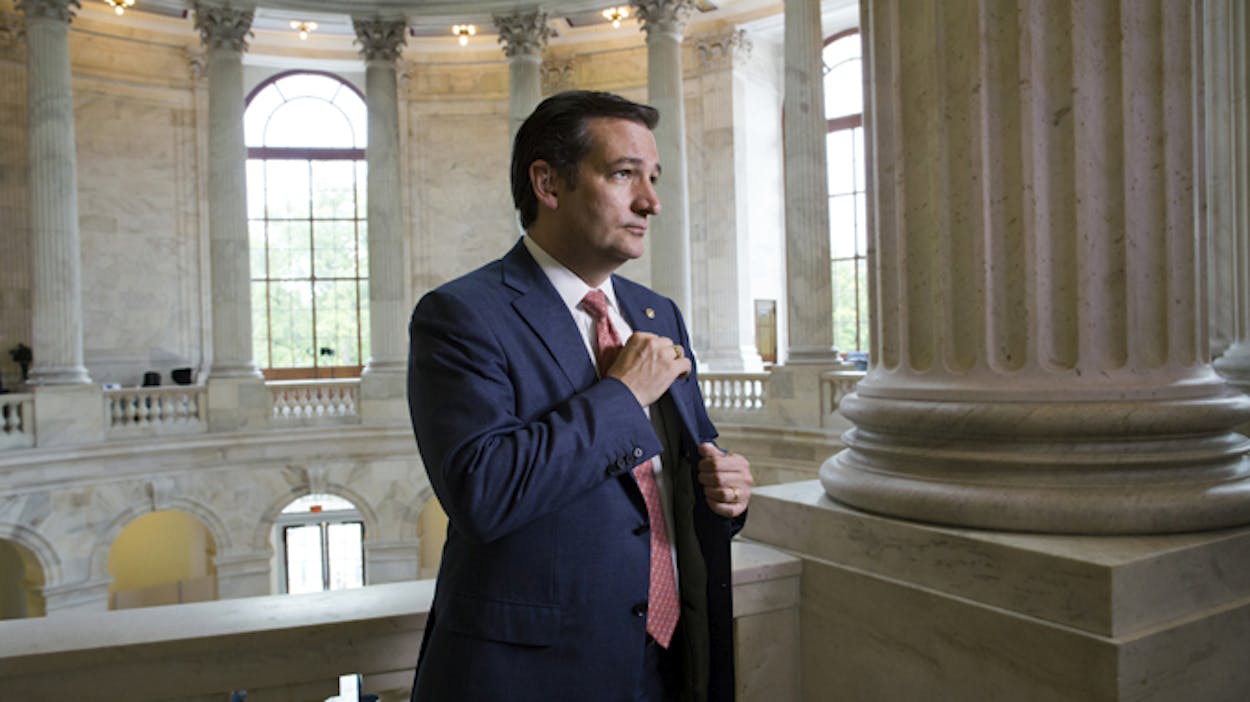Donald Trump remains the frontrunner for the 2016 Republican presidential nomination, though support for the toxic carnie has softened in the wake of his lackluster performance at the second debate on September 16th. Concurrently, two other candidates have broken through the crowded primary field; former HP CEO Carly Fiorina, boosted by her conversely strong performance at the Reagan Presidential library, is now polling in the double digits, and pediatric neurosurgeon Ben Carson, who emerged as a sort of temperate alternative to the squalling Trump, remains in second place in the most recent round of national polls.
Meanwhile, Texas Senator Ted Cruz continues to trundle along in the mid-to-high single digits. In April, according to the polling averages at Real Clear Politics, he was briefly among the top three candidates, after Jeb Bush and Scott Walker. By July, he had dropped to eighth; for the most part, though, he has hovered around fifth place. Thus far, in other words, Cruz’s campaign is going exactly to plan. When he announced his campaign, in March, it was clear that he expected the fight for the nomination to be a war of attrition. In June, he told radio host Hugh Hewitt that his campaign was prepared for the possibility of a brokered convention. In August, reports surfaced that he had gone so far as to send a consultant to Guam, to begin working on the tiny island’s nine delegates. So far, so smart.
But in the past few weeks there have been signs that he is strategically shifting, or even retooling, in response to the apparent durability of the Trump candidacy. Burgess Everett and Katie Glueck, at Politico, report that Cruz sees the looming Congressional fight over funding for Planned Parenthood as his chance to break through:
“Every election we see campaign conservatives who talk a good game on the campaign trail, and yet haven’t walked the walk,” Cruz told POLITICO in an interview last week. “The clearest distinction is that, of the Republican candidates running, I am the only consistent conservative who on issue after issue after issue has been the same yesterday, today, tomorrow.”
This is plausible. In the aftermath of the debate, Cruz’s campaign sent out a volley of press releases with similar subject lines: “Ted Cruz Has Been Leading the Fight to Stop the Nuclear Iran Deal,” “…to Secure the Border,” “…Against Judicial Activism”, “…to Restore the Constitution and End Obama’s Overreach,” “…to Protect the Unborn and Defund Planned Parenthood.” Without even reading the releases, you can discern the intended message: Cruz has already been leading all these fights that conservatives are clamoring for, and that competitors are vowing to wage.
It’s a tricky message, in a cycle in which the three most popular Republican candidates are the three with no experience whatsoever in elective office, and the first two candidates to drop out—Rick Perry and Scott Walker—had led various conservative fights for years, in their capacity as governors of Texas and Wisconsin respectively. And on the merits it should be especially tricky for Cruz to go on the offense against Trump, who is the obvious referent of the “campaign conservatives” euphemism quoted above. No candidate has been cozier with Trump than Cruz. In “leading the fight” against the Iran deal, for example, Cruz’s credentials include inviting the frontrunner to join him at the rally he organized in August. I continue to think that you could lose a lot of money betting against Cruz’s long game. But there’s walking a tightrope, and then there’s Cirque du Soleil.







